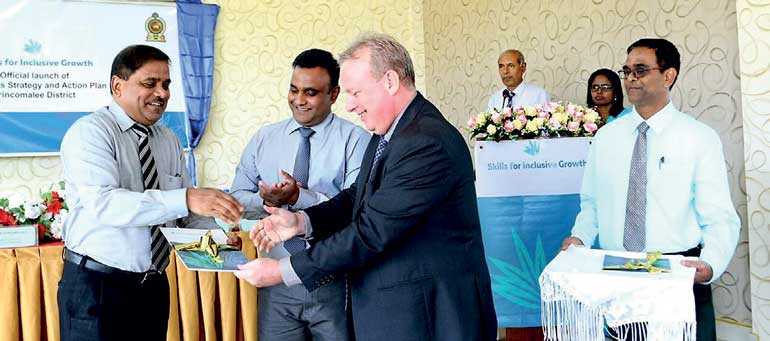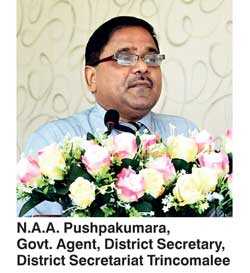Monday Feb 23, 2026
Monday Feb 23, 2026
Thursday, 6 September 2018 00:00 - - {{hitsCtrl.values.hits}}
 From left: N.A.A. Pushpakumara, Govt. Agent, District Secretary, District Secretariat Trincomalee, R. Sivasuthan, representative from the Department of Foreign Affairs and Trade (DFAT), David Ablett – Team leader Skills for Inclusive Growth program, and Timothy Emmanuel – Trincomalee, district coordinator – Skills for Inclusive Growth program
From left: N.A.A. Pushpakumara, Govt. Agent, District Secretary, District Secretariat Trincomalee, R. Sivasuthan, representative from the Department of Foreign Affairs and Trade (DFAT), David Ablett – Team leader Skills for Inclusive Growth program, and Timothy Emmanuel – Trincomalee, district coordinator – Skills for Inclusive Growth program
The Tourism Skills Strategy and Action Plan (SSAP) for the Trincomalee district was prepared by the Australian funded project, Skills for Inclusive Growth Program and was launched on 30 August at the JKAB Beach Resort Hall, Trincomalee.
N.A.A. Pushpakumara, Government Agent, District Secretary, District Secretariat Trincomalee, R. Sivasuthan, representative from the Department of Foreign Affairs and Trade (DFAT) and other relevant government partners, and district representatives, private sector representative from Trincomalee were present at the event.
The District Secretary mentioned that Trincomalee has a lot more untapped potential, and that the report was well prepared to address the constraints of demand and supply in the market. The current skills plan will be implemented over a period of three years, with an overall objective of increasing employment levels in the tourism and related sector will rise by 50%, bringing the numbers employed to around 7,000. This will be achieved through tackling skill gaps, raising the quality of jobs that people perform and helping to move the district from a low to a middle level skills equilibrium, as well as providing the foundations for a high skill growth path. Significant skill shortages face the hotels and guest houses in Trincomalee. Evidence from an enterprise survey identified that 38% of guest houses and 46% of hotels are experiencing a vacancy, much larger than in other districts. The top five vacancies were found in the following occupations: Cooks, front office staff managers, waiters, receptionists, and guest house officers. Skill gaps are also found among workers in the tourism sector in terms of cognitive, non-cognitive and technical skills. Tourism at the district level have been guided by several development plans.
To achieve this overall objective, the skills implementation plan will tackle several severe constraints facing the supply of skills. However, the plan recognises that skills alone cannot support growth, and that there is a need to facilitate demand and expand the operation of the value chain in the district. This will also be accompanied by encouraging more positive attitudes towards the sector and through building the institutional capacity of government to manage this process. The private sector and employers will play an important collaborative role in this process.